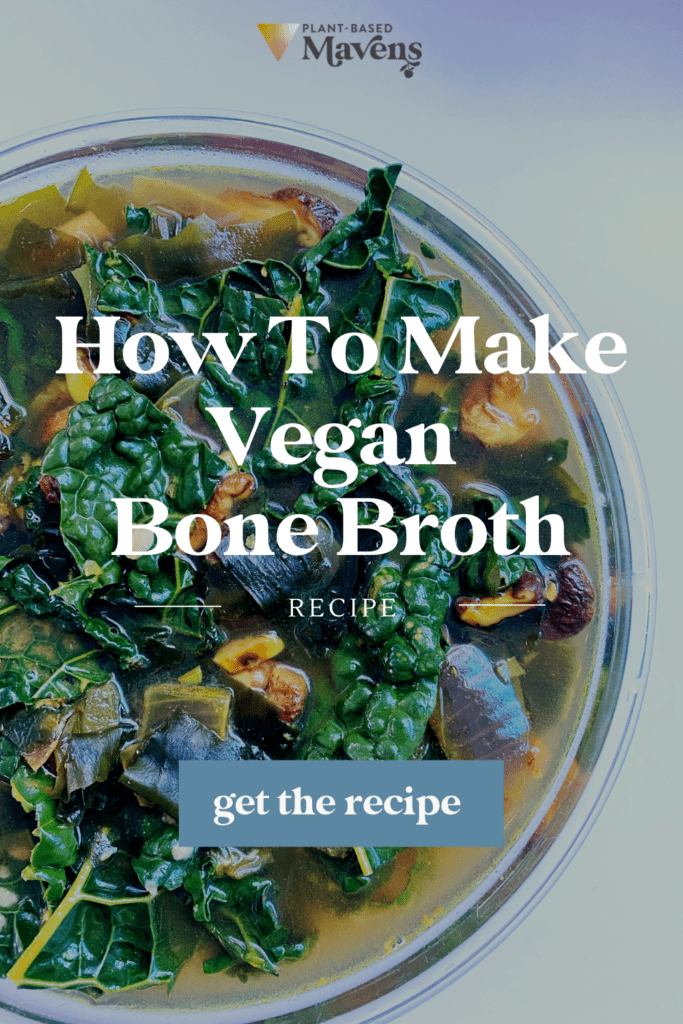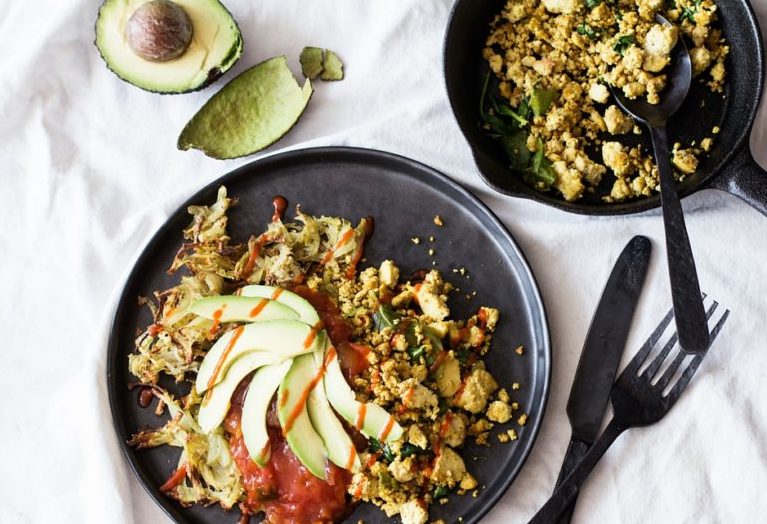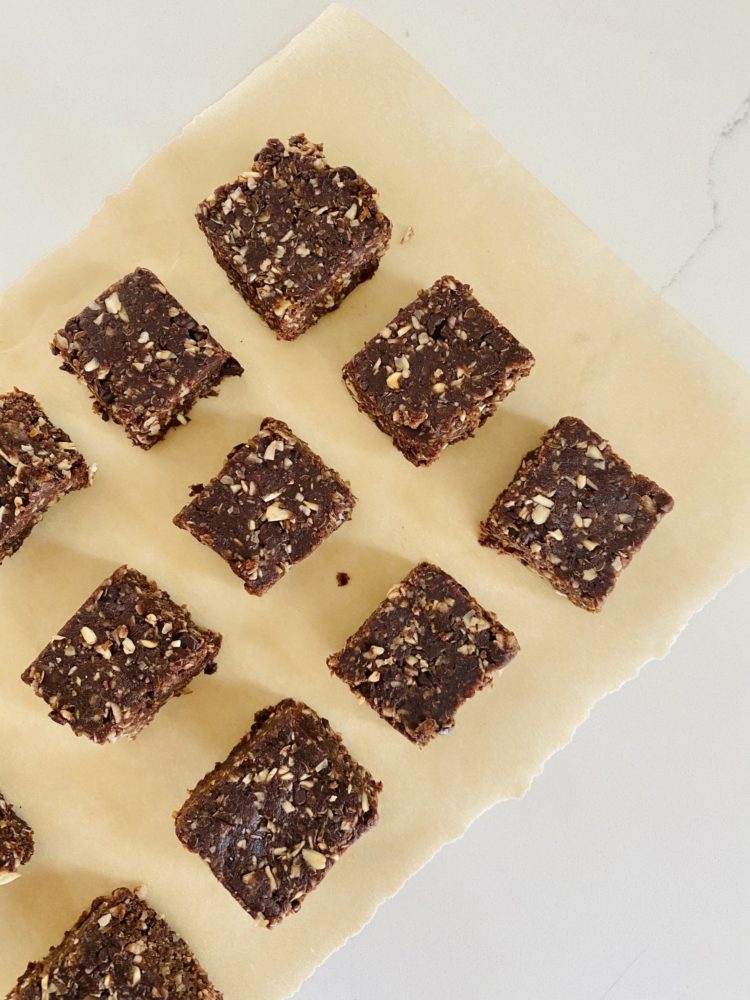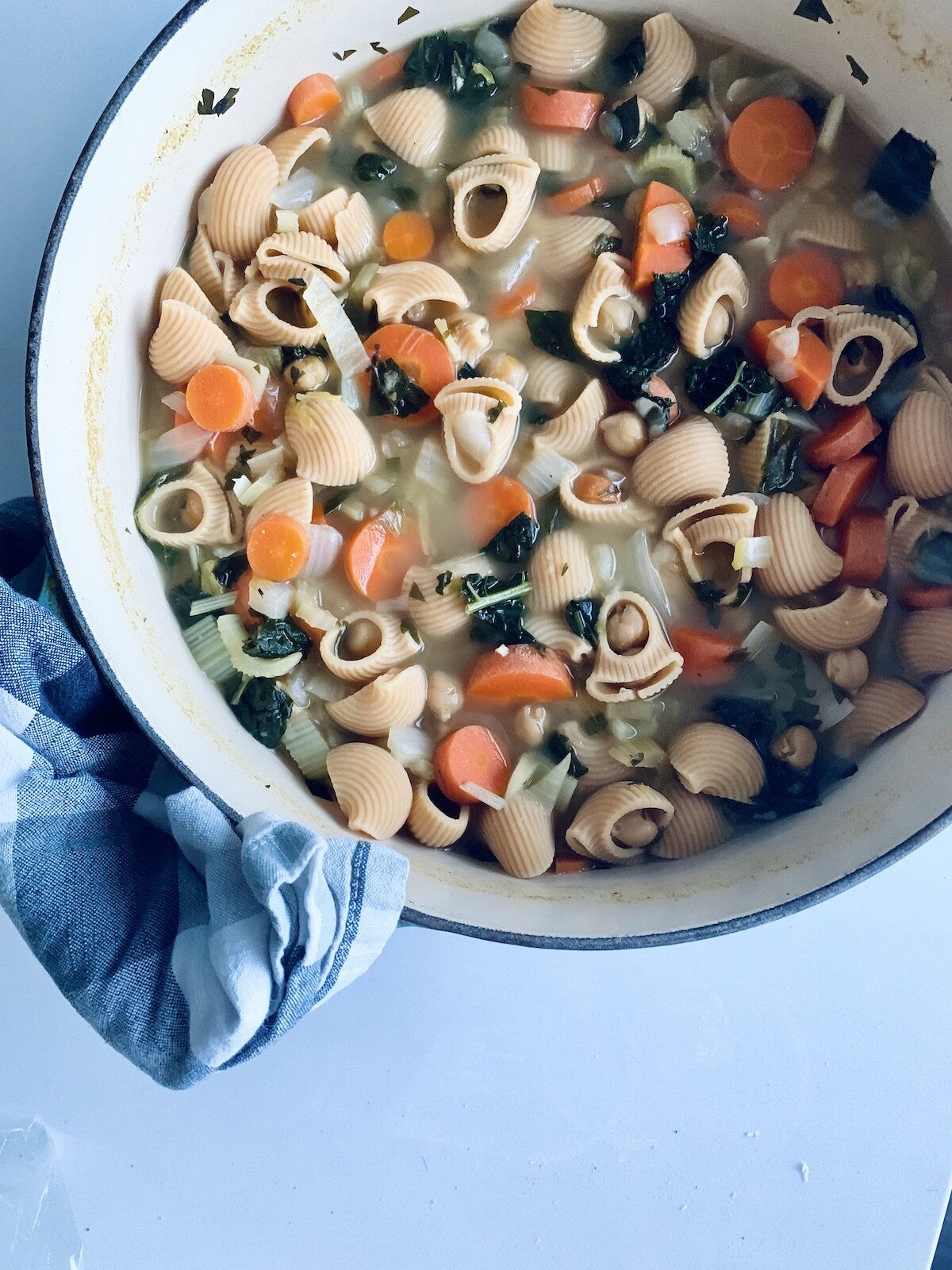Warm broth has been considered a healing food for centuries. We see this practice across many cultures, but in recent years the health claims attached to bone broth have become more and more grandiose. Is bone broth the magical gut healing, collagen building, nutrient-rich panacea that everyone claims? And is vegan bone broth a good (or even better) replacement? If you want to enjoy the health benefits of healing broth without the animal bones, this recipe is for you.

Is bone broth good for you?
Like most fad diets, bone broth is based on a granule of truth. It is true that broth has been considered a healing food for centuries. However, we have very little scientific evidence to support the bold claims that bone broth will heal your gut, support joints, build your collagen, or support your immune system. Most of the studies that do exist related to bone broth and collagen supplements are partially or fully funded by parties who stand to benefit from favorable study results.
One claim is that bone broth is rich in certain vitamins and minerals. The truth is that the vitamin and mineral content of bone broth varies widely and depends on the ingredients and preparation methods used. One study that tested multiple commercial and homemade bone broths shows that bone broth only contains <5% of daily recommended levels of vitamins and minerals. This hardly classifies it as a rich source.
Drinking bone broth made with animal bones is harmless at best, and potentially dangerous at worst.
Dangers of bone broth
Bone broth doesn’t come without risks. Animal bones can carry toxic heavy metals like lead which can end up in bone broth. While it’s unclear how much of these toxic heavy metals end up in bone broth (and impossible to tell from brand to brand or batch to batch without testing), the dangers of heavy metals are very clear, especially for children.
Does vegan bone broth have collagen?
One of the biggest claims related to bone broth is the benefit of collagen. Collagen is a protein in your body that is used to make connective tissue for the skin, bones, joints, and muscles. As we age, your body’s natural collagen production declines. Too much alcohol, sun exposure, smoking, not enough sleep or exercise, and poor eating habits can all contribute to this decline.
Bones contain collagen, so it’s claimed that bone broth can boost your collagen. Here’s the problem: eating collagen doesn’t equate to collagen in the body. When you eat collagen, your body breaks it down into individual amino acids (the building blocks of proteins). Then, your body makes use of those individual amino acids in various combinations as your body needs them.
Vegan bone broth doesn’t contain collagen because it’s made from plants. But because collagen in food doesn’t turn into collagen in your body, this isn’t necessarily a bad thing. Plant-based foods do contain many of the other nutrients that are used to support your body’s natural collagen production.
Foods that boost collagen production
Your body makes collagen from nutrients found in a healthy diet, including fruits, veggies, legumes, and whole grains. Food scientist Kantha Shelke says, “Eating a diet rich in leafy green vegetables is ideal. Plants offer richer sources in collagen building blocks and, in addition, provide nutrients not found in sufficient quantities in meats or broth.”
Foods that support natural collagen production include plant-based proteins from legumes and soy, whole grains, nuts, seeds, and vitamin C-rich produce like bell peppers, berries, citrus fruits, and tomatoes.
Vegan bone broth benefits
So, is vegan bone broth good for you? It’s certainly not bad for you, and it doesn’t come with the potential risks of animal bone broth.
Potential Benefits:
- Sipping warm liquids may help relieve nasal congestion when you’re sick
- Hydrating and electrolyte replacing
- Anti-inflammatory properties that can support reduction of whole body inflammation as well as joint inflammation
- May contain important nutrients for plant eaters like iodine
- Source of gut-supportive probiotics and prebiotics from fermented foods and fiber
- Boost of plant foods. Eating more plant-based foods is linked to healthy joints, bones, skin, gut, and immune system
What is vegan bone broth made of?
My Vegan Bone Broth recipe is a little unique in that 1) it contains miso paste for a boost of gut-healthy probiotics, and 2) I don’t strain it so that I get the full benefits of the ingredients including the fiber.
Extra Virgin Olive Oil
The addition of a fat source like olive oil helps to better absorb the fat soluble nutrients
Mushrooms
Shiitake mushrooms support the immune system, increase resistance to certain infections, and support healthy cholesterol and blood pressure
Seaweed
Seaweeds are the leafy greens of the water and contain important nutrients like iodine, potassium, calcium, magnesium, and iron
Kale
Dark leafy greens like kale have endless benefits including fiber, calcium, and iron
Garlic and Onions
Garlic and onions are members of the Allium family. They have anti-inflammatory and anti-microbial properties. Garlic in particular has a long history as a healing food. There is a Chinese proverb that says, “Garlic is as good as ten mothers.”
Turmeric and Ginger
These roots have proven anti-inflammatory properties
Miso Paste
Miso paste is a fermented food, and therefore contains probiotics
Yield: 4 | Author: Kayli Anderson MS RDN

Best Vegan Bone Broth
This vegan bone broth is loaded with nutrition-rich, healing ingredients with anti-inflammatory and immunity benefits. Try this bone broth alternative that’s actually good for you.
Prep time: 15 Min | Cook time: 1 Hour | Total time: 1 H & 15 M
Ingredients
- 6 cups of water
- 1 tbsp extra-virgin olive oil
- 1 cup shiitake mushrooms, sliced
- ¼ cup wakame seaweed
- 1 cup kale, stems removed and roughly chopped
- 4 garlic cloves, minced
- 1 onion, diced
- 1 tsp powdered turmeric
- 1 inch fresh ginger, grated
- 1 tbsp. miso paste
- 1 tsp sea salt
- ½ tsp. black pepper
Instructions
- Add all the ingredients except the miso paste to a large soup pot. Bring to a boil, then lower heat and simmer for 1 hour.
- Remove from heat and let cool slightly. If you want a broth, strain out the vegetables. You can also enjoy as a soup as-is or as a base for another soup recipe, adding beans, grains, tofu, etc.
- Place the miso paste in a bowl. Add a few spoonfuls of warm broth, and whisk the miso paste until it is thin enough to pour. Add it to the soup pot, and stir to incorporate.
- Enjoy immediately, refrigerate for up to 1 week, or freeze for up to 6 months.
The takeaway: no single food or recipe is a cure-all. Your immune system, overall health, and even your collagen production are the result of many factors including your overall eating habits, movement and sleep habits, and stress levels. If sipping this vegan bone broth makes you feel good, then sip away! But know that it’s the big picture that counts.
Want more vegan recipes?
Download the Easy Weeknight Dinners recipe book for delicious recipes ready in 30 minutes or less.


